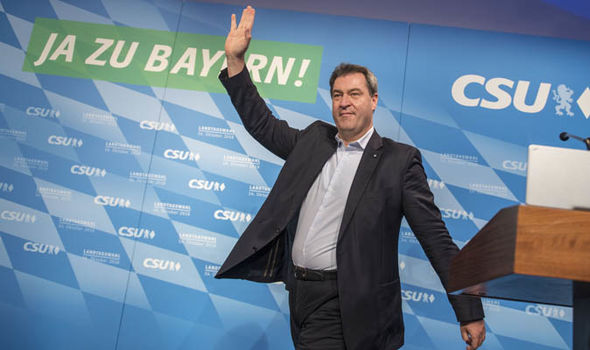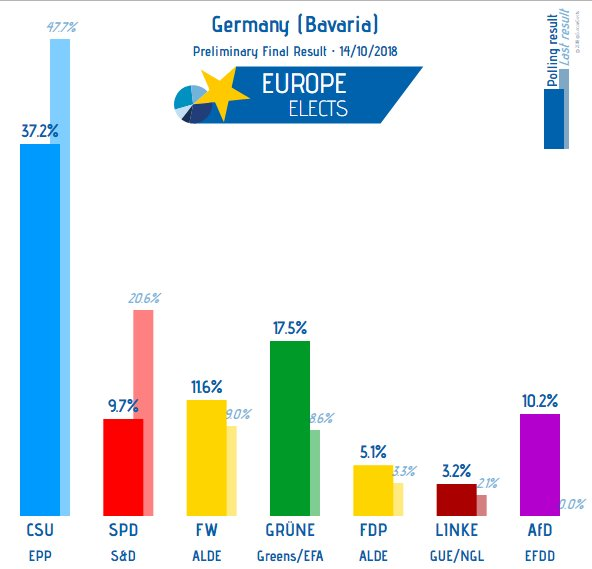Merkel’s allies lose
October 15, 2018 | Expert Insights

Voters in the southern German heartland of Bavaria dealt a stinging blow to Chancellor Angela Merkel’s conservative allies by voting in favour of the Greens, and the anti-immigration AfD party.
Background
Angela Merkel became the 34th Chancellor of Germany in 2005 and has since been in power. She is also the leader of the Christian Democratic Union (CDU). A former research scientist, she became a politician in 1989. By 1991, she had been appointed the Minister for Women and Youth in the federal government under Chancellor Helmut Kohl in 1991. In 1994, she was the Minister of Environment.
In 2005, she had become the first female Chancellor of Germany. By 2013, during the general election, Merkel was seen as a reliable leader in Germany. Her party won the election with 41.5% of the vote. It was a landslide victory. She is a strong proponent of transatlantic economic relations and seen as flagbearer for free trade. She is the longest-serving incumbent head of government in the European Union.
She has faced heavy criticism she has faced domestically regarding the issue of refugees, she has remained steadfast with implementing her agenda. In 2015, she came under fire for opening Germany to asylum seekers. At the time, she told the Germans that “we will manage” and did not change course.
In September 2017, Merkel’s conservative CDU/CSU bloc was able to retain its majority during the federal elections. However, it witnessed its worst results in almost 70 years. It won 33% of the votes. This is a sharp decline from the 2013 elections when it won 41% of the votes. Voter turnout, however, had increased to 76%.

Analysis
Voters in the southern German heartland of Bavaria dealt a stinging blow Sunday to Chancellor Angela Merkel’s conservative allies, humbling a party that has governed for decades while boosting either political flank in an election defined by polarized opinions about immigration.
The dramatic loss of support for the Christian Social Union (CSU), sister party to Merkel’s Christian Democratic Union (CDU), scrambled politics in a region that has been one of the most politically stable in Europe.
Votes for the Bavarian state parliament have rarely been competitive in modern lifetimes, with the CSU crafting a “laptops to lederhosen” approach that coupled its support for high-tech industry with its embrace of traditional culture. For decades, the CSU came as close as Western Europe gets to a state party.
Voters in the affluent region redistributed their support to both ends of the political spectrum. The result won’t end the CSU’s 61-year streak in power, but it forces the party to bargain for partners. And it will almost certainly add to the strain on an already beleaguered Merkel, whose other coalition partners, the centre-left Social Democratic Party (SPD), was also punished Sunday. The combined share of the vote won by the SPD and CSU was down more than 20 per cent since the last election, in 2013.
“It’s an earthquake,” said Thomas Kleine-Brockhoff, who leads the German Marshall Fund’s office in Berlin. “People are dissatisfied with this so-called grand coalition. This is not the way they want things.”
The results showed the CSU falling from nearly half the vote five years ago to 37.2 per cent. The Green Party surged to second place, with 17.5 per cent, and the far-right Alternative for Germany is set to enter the Bavarian parliament for the first time, with 10.2 per cent.
The CSU has ruled out a coalition with the AfD but could strike a deal to govern with one or more smaller conservative parties — or perhaps with the Greens.
Assessment
Our assessment is that the CSU’s impressive six-decade dominance of German politics looks to be at risk. Merkel has held on to the Chancellor’s position after last year’s disruptive Federal election but reduced vote share meant she has to share power with smaller parties. We believe that in order to hold on to the CSU stronghold of Bavaria, Merkel’s allies will strike a bargain with smaller, independent parties to retain their position in power.








Comments